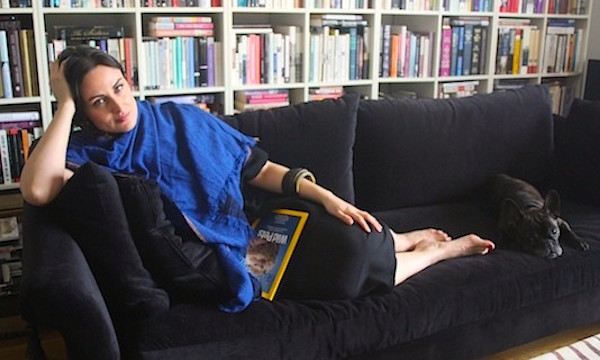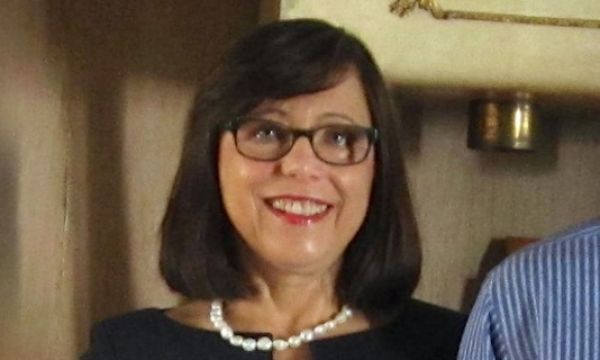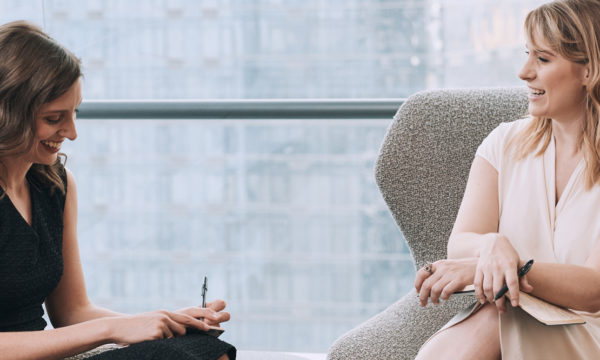Padma Lakshmi Is on a Mission to Tell the Truth
With her new show, “Taste the Nation” (premiering June 19 on Hulu), she challenges us to think in a more nuanced way about the diverse cuisines—and the immigrant communities—that give the United States its authentic flavor.

Shop This Look
When I was four, I wanted to be a flight attendant. That life seemed really glamorous to me. I would see all these ladies with their little wheelie suitcases flying all over the world, and they seemed so free and independent. That’s all I wanted, and it’s not so different from what I ended up doing, except with food and maybe a little more stress. I’m lucky to make a living doing what I genuinely love to do—and would do anyway, even if it weren’t my job. That’s the advice I would give to any young woman: Figure out what your talents are and what you like to spend time doing—not what you think you should do, but what you already enjoy doing. Then try to turn that into a career. So for me, that’s flying around the world with my little wheelie, just like I wanted to when I was four, looking for great food.
Want more M Dash?
Sign up for our weekly newsletter.
Thank you!
I spent my twenties trying to be like everybody else so that I could get hired as a model or actress. Then I slowly realized, somewhere in my thirties, that the things that made me different were actually going to (A) lead to success, and (B) were also the most authentic things about me. Those differentiators were the things I should have been sharing with the world. My upbringing straddled two cultures (I went back and forth between India and the U.S.), which allowed me to develop a perspective that’s broader than if I’d just grown up in a monoculture. And then as an actor and a model, I shot movies all over the world—Sri Lanka, Morocco, Cuba. Wherever I went, I would always check out the local food, the local spice market, the farmer’s market. I would try to find the places where the cab drivers ate, because that’s where the real food is in a community—it’s not in hotels or fancy restaurants. Those experiences informed everything I do, and I wouldn’t have the career I have now if it weren’t for my upbringing and my early travel experience.

The idea for Taste the Nation was really two ideas melded into one. I was working on a proposal for a cookbook, and I showed it to my producer, who was working on an immigration show. He was like, “We should combine them.” This show is different from typical food programming. It’s not demonstrational, and it’s not like some shows where the hosts are just gobbling food and being bro-y. This show is my point of view, and it’s very editorial. I wanted to explore the emotional impact of food and how our emotional memories are tied to it. For immigrants, the biggest way to hold onto their culture is through what they eat. I’m an immigrant myself, so that interested me.
Immigration is a very wrought and personal subject for me, and I started working with the ACLU on immigration rights shortly after the 2016 election, when Trump enacted the Muslim Ban. Most people who leave everything they have and everyone they love to come to a new country do so because it’s the best choice for the wellbeing of their family. That was certainly the case for my mother and me when we left India for the United States. So to have people vilified for wanting a better life is heartbreaking to see, and I wanted to do something about it. This show is a direct offshoot and product of my work with the ACLU. That’s where the idea came from.


I’m into truth. I like truth. And the truth about “American food”—or what we think of as American food—is that most of it did not originally come from North America. When you actually look at the roots of “American” foods like apple pie and hamburgers, they come from many places, including Asia and Africa. Even wheat flour—which we use in everything—originally came from Europe. Not a single ingredient in apple pie, including the apples, is native to North America. We taught ourselves these fairytales. So with Taste the Nation, I wanted to be real about who made this country, what it’s made of, and what we’re actually eating, rather than what we like to say we’re eating or how we like to present ourselves as Americans. I wanted to get to the truth.
I try to help where I can, and all of the issues I work on are personal to me, even if it’s not immediately apparent. With endometriosis, it was a huge part of my life, and I didn’t want the next generation of women to suffer like I did—despite the fact that I had good health insurance and access to medical care. And I choose to work with Planned Parenthood because a lot of young women can’t even get health insurance until they get their first serious job, so they rely on Planned Parenthood for healthcare. It’s hard for women to have a fighting chance when they’re down with menstrual cramps or heavy bleeding or they can’t get proper birth control or a PAP smear, so these causes are personal and meaningful to me.

I’ll tell you what I wear nowadays: I wear jeans and a silk blouse with a skinny belt. I wear dresses that are simple and can go from day to night with accessories. And then I wear a lot of jumpsuits, because it’s like the pants version of a dress—you don’t have to worry about a matching top. When I’m traveling, I pack a lot of sweater dresses, because they don’t wrinkle. And I try to stick to a uniform of just a few looks, and just two or three colors that go together. My colors are usually black and cream, with a couple bright pops.
The ultimate “me time” is: a crisp pair of pajamas, a freshly made bed, a hot bath, a Sunday New York Times—and nobody else in the house for several hours. There’s nothing more glamorous than that. I don’t need much more than a newspaper and a bathtub and people to leave me alone. At this point in my life, my greatest luxury is time to read. I know that sounds incredibly boring, but it’s true.

In our culture, we tend to put women in boxes. Because I do a lot of work with the ACLU or with Planned Parenthood, some people get mad when I then post a bikini picture. They think those two things don’t square, like somehow I can’t be both a smart woman and a sensual woman who is in touch with her sexuality and her body. Or I can’t be a loving mother but also pose in a sexy photo shoot. Or I can’t be funny but also address serious political issues. Well, I think most human beings are layered and nuanced, and those are the most interesting people anyway. But whatever box you’ve been put in, you have to break through and will into existence a space for all the parts of you.
I have a real potty mouth, and I get in trouble for it with my daughter. And my sense of humor is much baser than people think—I’m much more off-color when I’m off camera. Sometimes people are surprised in business meetings if I am assertive and ask for stuff. They get ruffled, because they expect me to be very polite, which I am. But I think women have it really hard, because we’re supposed to be good at everything and then we’re supposed to be great moms and great partners and be sweet and likable. I don’t really care about being liked; I care about being respected.
Photos by Rich Gilligan.







